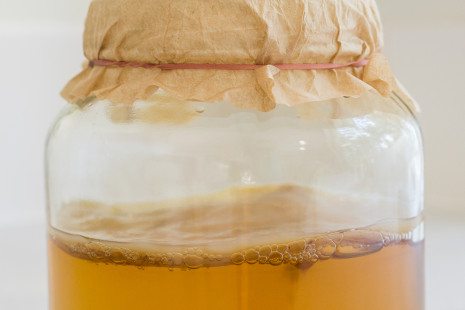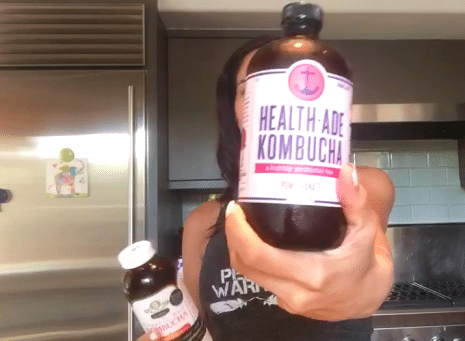Many of you have written to me wondering about kombucha. Today I am going to share my thoughts with you. You ask, I answer!
If you have never heard about kombucha, I will be sharing some tips and insights on this fermented beverage that is becoming increasingly popular. Fermented foods are a big part of the Beauty Detox lifestyle, but not all fermented foods are created equal…so I will cover where this fermented beverage fits in.
If you have never experienced kombucha, it’s smell and taste may take you off guard. Some say it smells like beer and tastes like carbonated apple cider vinegar… and let’s not forget all those “slimies” floating around in it! My friend described it as “vinegar water with boogers”. Doesn’t sound so appetizing does it?! Don’t be alarmed…you may notice some strands of the good bacteria are in your beverage when you are drinking it. And some varieties are more filtered than others. The fizzy carbonation of kombucha appeals to some, especially those getting over a sugar addiction.
What is Kombucha?
Kombucha has been consumed for thousands of years. It is a fermented probiotic drink that you can make yourself with a kit or purchase in a local health food store.
Long, long-term Beauty Detox readers may remember some stories and photos of my old kombucha kit from my little New York City apartment. It didn’t really work out for me, because the SCOBY (symbiotic culture of bacteria and yeast, which we’ll talk about more in a moment) that grows the kombucha just grew so fast that I couldn’t keep up with drinking enough, or giving enough away to friends and yoga students, and it got to be almost like true vinegar water in a short amount of time! In truth, it was kind of nasty to peer into the container and see the slimy SCOBYs growing and swimming around…I couldn’t take it anymore! :-o
With it’s increase in popularity in recent years in the mainstream public, more brands have emerged selling this product. So you don’t have to worry about making it yourself, thankfully.
But there are some important guidelines to consider before choosing one. First of all, be sure you look at the label when you are purchasing kombucha.
One key thing to look for is to make sure the brand is organic! As always that is very important. It’s often made from a mix of tea and sugar, which are ingredients that can have a lot of pesticide contamination. Secondly, you want to make sure that you are purchasing a flavor/variety that is lower in sugar. Most bottles hold two servings, so you just want to be mindful of how much you are consuming and to be sure it is the lower sugar option.
I’ve seen brands that contain upwards of 24 grams of sugar per bottle, which is simply too much for something that doesn’t contain any “nutritive” sugars, ie whole, antioxidant-containing fruits.
How is it made?
Kombucha is made from tea, sugar, a SCOBY (more on this below) and a starter from a previous batch, like sourdough bread. Now you may be thinking SUGAR?…but don’t worry the sugar and caffeine is mostly transformed in the fermentation process.
As you will see when checking the label, it barely has any caffeine or sugar left by the time it is ready for you to drink. If you want to try making this at home, you will need a starter kit if you want to make your own kombucha**.
I highly recommend if you have never had it before, you may want to try an organic brand first to make sure you like it! The two brands I like are GT Kombucha (which is very widely available) and Health-Aid. They are both organic and tasty! For GT I like the ginger and grape flavors, and for the Health-Aid I like the pomegranate and green apple flavors.
You may have been wondering…
What is a SCOBY?
A SCOBY is an acronym for symbiotic colony of bacteria and yeast. It is a popular term (rather than scientific) used to refer to mixed cultures of bacteria and yeast present during the production of kombucha.
In short, the SCOBY are beneficial bacteria and yeast that work together to produce fermentation.
Why is it fizzy?
During the fermentation process, which can take anywhere from 7-30 days, the kombucha becomes naturally carbonated, giving it that fizzy feeling we all know from other carbonated beverages like soda.
If you are transitioning into the Beauty Detox Lifestyle and “getting off” soda, you may really enjoy Kombucha…but just like anything, you want to consume it in moderation. I have a bottle about once per week or every two weeks (sometimes less and sometimes a little more); I do not consume it everyday.
When Should I drink it?
I was talking with my Ayurvedic teacher Doctor Jay, who has been on my podcast and videos before…and he recommends drinking kombucha on it’s own, between meals. The kombucha can have a guru, or “heavy” property to it, so is not necessarily something you would want to consume with a meal.
Some other experts I’ve talked to are not so into kombucha as they think it may have regressive qualities, since it’s grown on the not-so-great ingredient of cane sugar. I personally don’t take that stance, as I think it can be consumed in moderation…but on the other hand, I also don’t think it’s necessary either (more on that, below).
In other words, you would not want the kombucha to be in your system when you are trying to digest food. Even though it purportedly contains some probiotics and enzymes, I still think it’s better to take digestive enzymes before eating and save your liquid kombucha for in between meals.
Health Benefits
There are many health claims about kombucha, but not many studies confirming these claims. This can be a beverage you can love and enjoy, but it should never be used to supplement or substitute for anything else in your routine.
One big thing I want to point out here is drinking Kombucha is NOT a substitute for taking your SBO probiotics. You can enjoy it as a fun drink that has some tasty flavors, and is certainly better than soda, but it does fall short on providing you the full spectrum of strains of bacteria in the way that an excellent probiotics supplement does.
Our gut health is extremely important to our overall health and beauty and I highly recommend starting on probiotics if you are not currently taking them. You can read more about my probiotics and there benefits here. Again, please be sure to consume kombucha in moderation…and remember it is not recommended as a “must” to add into your diet. It’s more of a treat if you want to drink something fizzy or want a flavored beverage. But you absolutely do not need to ever drink it (especially if the taste makes you gag!).
***
I hope you had fun with me on today’s blog learning a little more about kombucha and what I think about it! Remember to tune in to the podcast on Thursday where you can have more of your questions answered! You can submit your question also at mysolluna.com/askkimberly. I am listening and here for you.
Let me know what you think of kombucha in the comments below!
Lots of love,
Kimberly
** The FDA and CDC warns that home-brewed kombucha produced under poorly regulated conditions can be contaminated with harmful microorganisms, particularly toxic molds. However, store-bought bottles are not considered risky because they are produced in a sterile, carefully controlled environment.




a lot of people say it causes yeast infections. do you agree?
Hi Anndee…The kombucha is well-tolerated by many people. However, if you are struggling with any health disorder, you may want to think twice about drinking wildly fermented beverages like kombucha tea, especially if you have a pre-existing Candida yeast infection.
If you want to know whether or not kombucha tea is right for you, I encourage you to speak with your primary care physician. Hope this helps! ;)
Thank you!
Hi Kimberly, What are your thoughst on the health benefits of Fermented Coconut Water? I have not tried Kombucha. A fermenting site I visit suggested the FCW instead of Kombucha.
Hi Susie…here is a blog post I wrote about some of the drinks I approve of. Check it out when you get a chance: https://bit.ly/1pXalxX Because we all assimilate our foods/drinks differently, I encourage you to talk to your Health Care Practitioner for advice on anything you have a concern about. Hope this helps! ;)
I’ve read in different places that kombucha ends up with alcohol in it due to the fermentation process I guess. Is that true?
Hi Brooklyn…thanks for your question. Yes, kombucha can have a trace alcohol but it is very low . Most batches of kombucha tea will contain between 0.5% and 1.0% alcohol, which is just slightly more than “near-bear” or quote-unquote “non-alcoholic beer.” It’s a personal decision on whether you decide kombucha is something you wish to add to your diet. Always listen to your gut. Sending lots of love! ;)